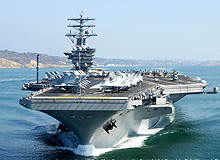
Located in and around the Hawaiian Islands, RIMPAC 2012 is the 23rd such exercise after its inception in 1971. Whilst new and emerging technologies will be tested, the key aim of the exercise is to increase interoperability between participating nations and boost cooperative relationships in the region.
As nations around the Pacific Rim descend upon Hawaii for the start of the exercise, naval-technology.com profiles participating nations and compiles a complete list of vessels set to feature in the exercise.
For a full profile of the aircraft set to feature in the exercise, please see our article RIMPAC 2012: the aircraft and helicopters.
Australia – Adelaide, Anzac and Collins Class
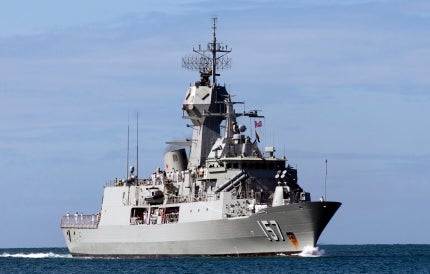
HMAS Perth (FFH 157) Anzac Class frigate.
The Royal Australian Navy (RAN) will be sending a total fleet of three vessels to participate in the exercise. Adelaide and Anzac Class frigates HMAS Darwin and HMAS Perth will be present, alongside the Collins Class submarine, HMAS Farncomb. Australia also looks set to participate alongside other nations in a series of mine-countermeasure (MCM) and explosive ordnance disposal (EOD) drills, with MCM and EOD detachments representing the nation as well as an Autonomous Underwater Vehicle (AUV).
- HMAS Darwin (FFG 04) – Adelaide Class frigate
- HMAS Perth (FFH 157) – Anzac Class frigate
- HMAS Farncomb (SSG 74) – Collins Class submarine
Mexico – tank landing ship and troops

ARM Usumacinta (A-412), formerly USS Frederick, a Newport Class tank landing ship.
Mexico looks set to be represented by Newport-class Tank Landing Ship the ARM Usumacinta, formerly known as the USS Frederick during its service with the US Navy. An infantry platoon will also be fielded, participating alongside infantry from other nations in exercises.
- ARM Usumacinta (A-412) – tank landing ship
South Korea – displaying amphibious landing capability
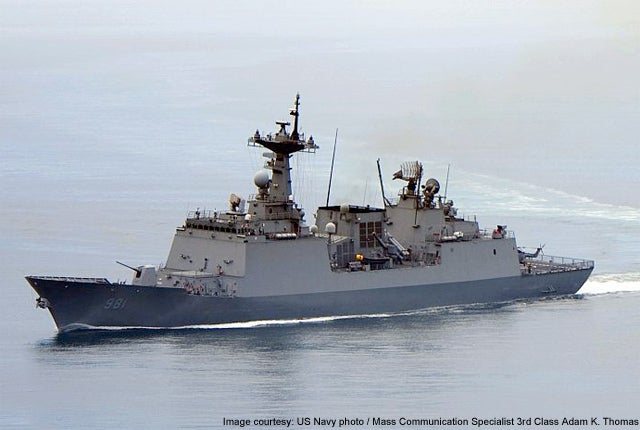
ROKS Choi Young (DDH 981) Chungmugong Yi Sunshin Class destroyer.
South Korea’s participation in the exercise looks set to be the most contentious as the nation defies its northern counterparts’ threats against such military exercises. The Republic of Korea Navy will dispatch two destroyers, the Sejong the Great class destroyer ROKS Yulgok Yi-I and the Chungmugong Yi Sunshin class destroyer ROKS Choi Young, as well as the Chang Bogo Class submarine ROKS Nae Dyong.
For the first time in RIMPAC history, a South Korean marine platoon will actively participate in exercises as the nation looks to hone its amphibious landing capabilities in what could be seen as a response to North Korea’s bombardment of Yeonpyeong island in November 2010 that killed two civilians and two soldiers.
- ROKS Nae Dyong (SS 069) – Chang Bogo Class submarine
- ROKS Yulgok Yi-I (DDG 992) – Sejong the Great Class destroyer
- ROKS Choi Young (DDH 981) – Chungmugong Yi Sunshin Class destroyer
Canada – littoral defence, EOD and MIW
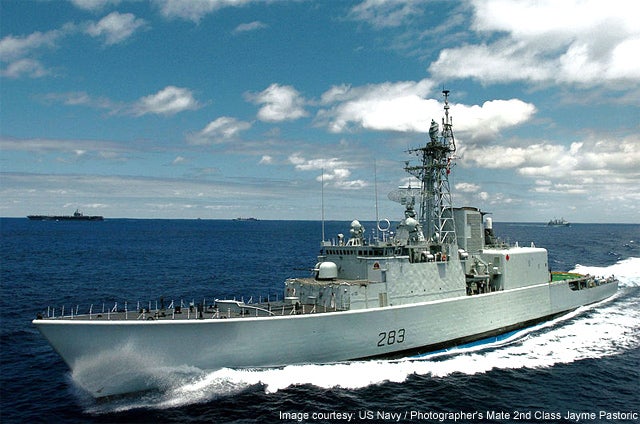
HMCS Algonquin (DDG 283) Iroquois Class destroyer.
The Royal Canadian Navy (RCN) will send an array of vessels to Hawaii. The Iroquois Class air defence destroyer HMCS Algonquin, the Halifax Class frigate HMCS Ottawa, the Victoria Class long-range patrol submarine HMCS Victoria and the Kingston Class coastal defence vessels HMCS Yellowknife, HMCS Saskatoon and HMCS Brandon will be present.
The Royal Canadian Navy will also be participating in EOD and MIW drills alongside other nations such as Australia, New Zealand, Chile and the US with the presence of RCN fleet diving unit and infantry company.
- HMCS Algonquin (DDG 283) – Iroquois Class destroyer
- HMCS Ottawa (FFH 341) – Halifax Class frigate
- HMCS Victoria (SSK 876) – Victoria Class submarine
- HMCS Yellowknife (MM 706) – Kingston Class littoral vessel
Japan – Kongo, Shirane and Uraga
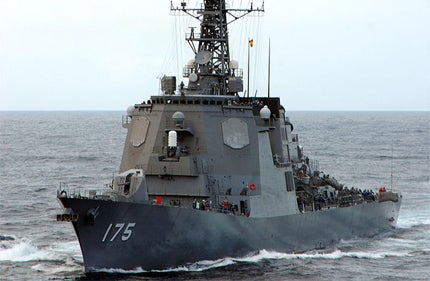
JS Myoko (DDG-175) Kongo Class destroyer.
Three vessels will represent Japan during the exercise, the Kongo Class destroyer JS Myoko, the Shirane Class destroyer JS Shirane and the Uraga Class escort battle carrier JS Bungo. Japan will be hoping to avoid controversy after its participation in a sinking exercise last year, which involved six vessels firing at the 19,000t USS New Orleans. Legal experts criticised Japan’s participation claiming the joint shelling of a common target could be construed as "collective defense", an act banned under Japan’s constitution.
- JS Myoko (DDG-175) – Kongo Class destroyer
- JS Shirane (DDH-143) – Shirane Class destroyer
- JS Bungo (MST-464) – Uraga Class escort battle carrier
Russia – first vessels at RIMPAC
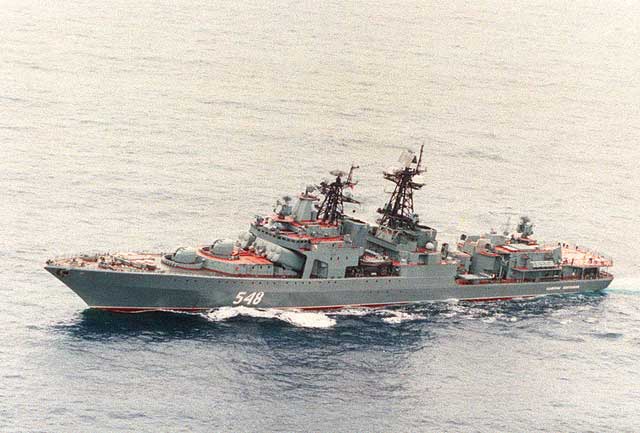
RFS Admiral Panteleyev (BPK 548) Udaloy Class destroyer.
Russia will send vessels to participate in the exercise for the first time, underpinned by the presence of its Pacific Fleet unit, consisting of the Udaloy Class destroyer RFS Admiral Panteleyev, as well as the salvage tug RFS Fotiy Krylov and the tanker RFS Irkut. Official observers have represented the nation at previous exercises, but RIMPAC 2012 will be the first time vessels have participated. The fleet departed Vladivostok on 13 June 2012.
- RFS Admiral Panteleyev (BPK 548) – Udaloy Class destroyer
- RFS Fotiy Krylov – salvage tug
- RFS Irkut – tanker
Chile – Type 23 and mine warfare team
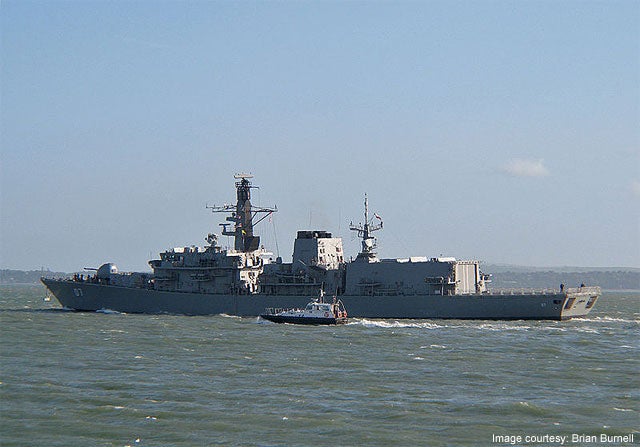
CS Almirante Lynch (FF 07) Type 23 frigate.
The Chilean Navy will be represented by the Type 23 frigate CS Almirante Lynch, formerly the HMS Grafton prior to its commissioning into the Chilean Navy in 2007. Chile will also be sending a mine warfare diving team working alongside the other nations.
- CS Almirante Lynch (FF 07) – Type 23 frigate
France – only vessel from western Europe
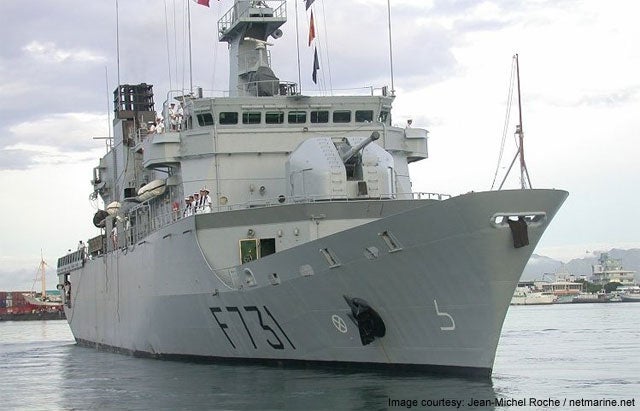
FS Prairial (F 731) Floréal Class frigate.
France will be the only western European nation to send a vessel for RIMPAC 2012, with its sole deployment for the exercise will be the Floréal Class frigate FS Prairial. FS Prairial’s participation in the exercise is likely to be considered key given its ability to operate within littoral waters. Other Western European nations will be participating but not sending vessels, with both Norway and the UK sending a Combined Task Force and component staff contribution and Netherlands sending a fleet diving unit.
- FS Prairial (F 731) – Floréal Class frigate
New Zealand – Anzac Class and AUVs
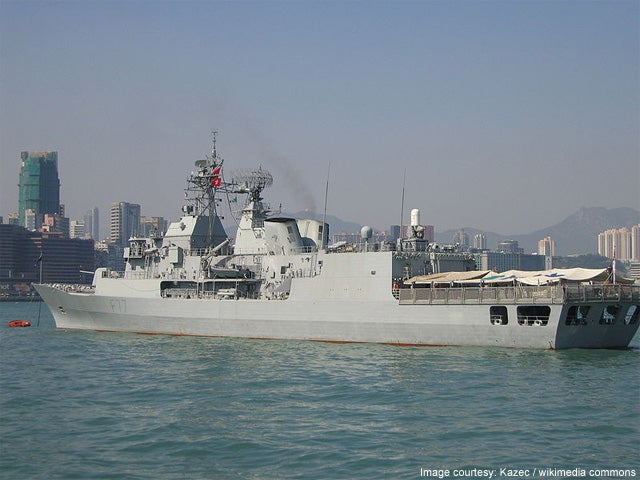
HMNZS Te Kaha (F 77) Anzac Class frigate.
New Zealand will, like Australia, deploy an Anzac class frigate, HMNZS Te Kaha, for the exercise, and that will be joined by fleet oiler HMNZS Endeavour. The nation is also sending a strong underwater contingent, joining the US, Canada and Australia in dispatching an operational diving team, a mine countermeasure team and an Autonomous Underwater Vehicle (AUV).
- HMNZS Te Kaha (F 77) – Anzac Class frigate
- HMNZS Endeavour (A 11) – fleet oiler
Singapore – Formidable display
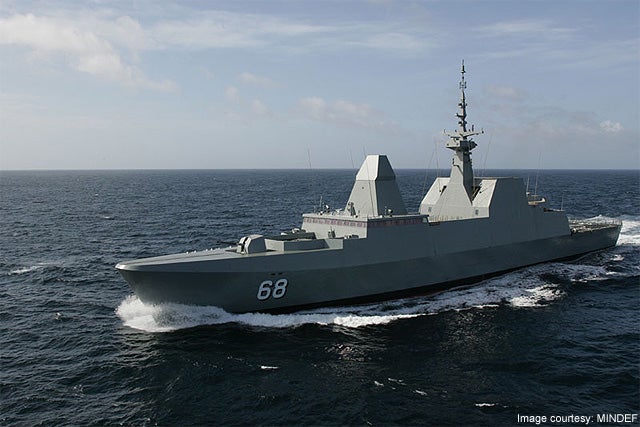
RSS Formidable (68) Formidable Class frigate.
Singapore will be represented by the Formidable Class frigate RSS Formidable, a multi-mission derivative of the French Navy’s La Fayette class frigates. Described as the "most advanced surface combatants in Southeast Asia", RSS Formidable’s participation in RIMPAC 2012 follows up on RSS Supreme’s deployment for RIMPAC 2010, where it participated in exercises within littoral waters.
- RSS Formidable (68) – Formidable Class frigate
USA – submarines
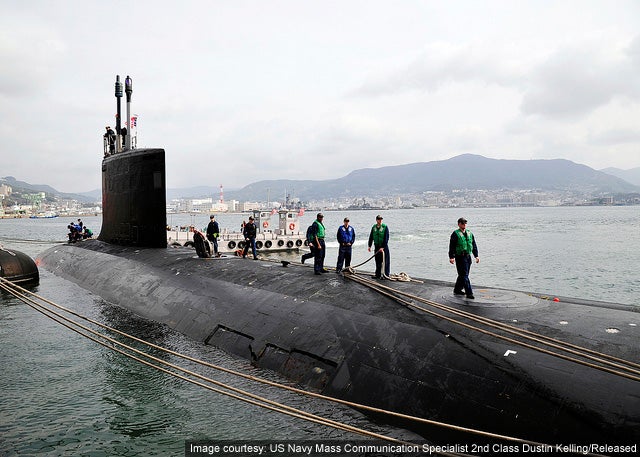
USS North Carolina (SSN 777) Virginia class submarine.
The strong US contingent will be assisted by the presence of three submarines, most notably the Virginia Class attack submarine USS North Carolina, the fourth Virginia Class submarine to be commissioned by the US. The Virginia Class is the most advanced submarine at the US’s disposal and comes at a price of approximately $2.4bn per unit.
The USS North Carolina will be joined by two Los Angeles class submarines, the USS Cheyenne and the USS Charlotte.
- USS North Carolina (SSN 777) – Virginia Class submarine
- USS Cheyenne (SSN 773) – Los Angeles Class submarine
- USS Charlotte (SSN 776) – Los Angeles Class submarine
USA – aircraft and helicopter carriers
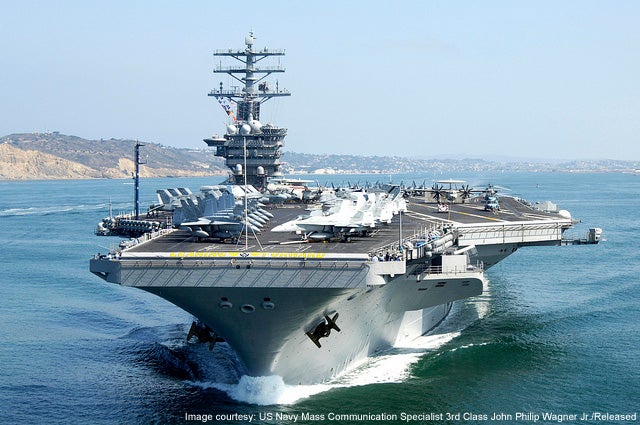
USS Nimitz (CVN 68) Nimitz Class aircraft carrier.
The USS Nimitz’s participation in the exercise is most notable as the Nimitz Class aircraft carrier will head the Great Green Fleet, scheduled to be powered using biofuel blend as part of the nation’s move towards a more environmentally friendly fleet. The US purchased 450,000 gallons of biofuel specifically for the exercise at a cost of $12m – the largest single order of biofuel to date.
The Wasp Class amphibious assault ship USS Essex will also participate in the exercise despite its recent collision with USNS Yukon, having previously pulled out of Cobra Gold 2012 citing mechanical issues.
- USS Nimitz (CVN 68) – Nimitz Class aircraft carrier
- USS Essex (LHD 2) – Wasp Class amphibious assault ship
USA – Ticonderoga Class cruisers

USS Chosin (CG 65) Ticonderoga Class Aegis guided missile cruiser.
A total of four Ticonderoga Class Aegis guided missile cruisers will represent the US Navy at RIMPAC 2012, with the USS Princeton having been named as a vessel within the Great Green Fleet. The USS Chosin, USS Lake Erie and USS Port Royal will also be participating in the exercise.
- USS Princeton (CG 59) – Ticonderoga Class Aegis cruiser
- USS Chosin (CG 65) – Ticonderoga Class Aegis cruiser
- USS Lake Erie (CG 70) – Ticonderoga Class Aegis cruiser
- USS Port Royal (CG 73) – Ticonderoga Class Aegis cruiser
USA – Arleigh Burke class destroyers
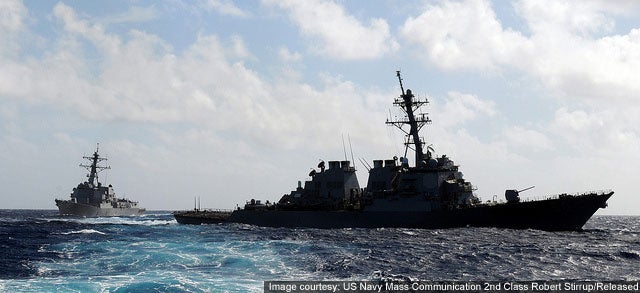
USS Paul Hamilton (DDG 60) and USS Chung Hoon (DDG 93) Arleigh Burke Class destroyers.
Five Arleigh Burke Class destroyers are scheduled to be active for RIMPAC 2012, representing the largest contingent of any one class at the exercise. Two of the destroyers, the USS Chafee and USS Chung Hoon, have been named as part of the Great Green Fleet, whereas the USS Paul Hamilton, USS Higgins and USS Stockdale have not.
- USS Paul Hamilton (DDG 60) – Arleigh Burke Class destroyer
- USS Higgins (DDG 76) – Arleigh Burke Class destroyer
- USS Chafee (DDG 90) – Arleigh Burke Class destroyer
- USS Chung Hoon (DDG 93) – Arleigh Burke Class destroyer
- USS Stockdale (DDG 106) – Arleigh Burke Class destroyer
USA – Oliver Hazard Perry Class frigates
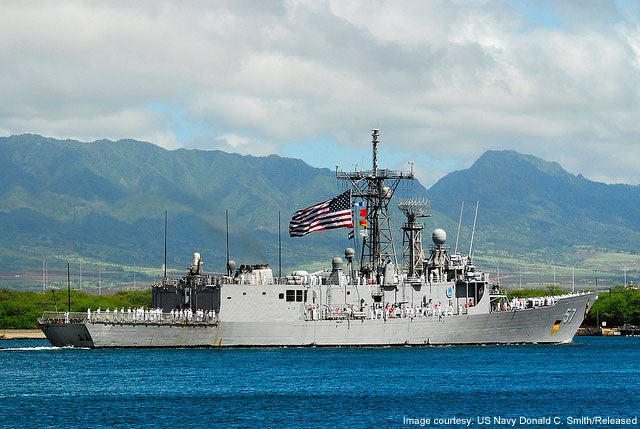
USS Reuben James (FFG 57) Oliver Hazard Perry Class frigate.
Three Oliver Hazard Perry Class frigates have been named within the US Navy’s RIMPAC 2012 fleet, although perhaps surprisingly not one has been named within the Great Green Fleet. The Oliver Hazard Perry Class frigate USS Ford achieved great success whilst running on biofuel in March 2012, sailing 12,000 miles on a 50-50 blend of algae-derived, hydro-processed algal oil and petroleum. The USS Crommelin, USS Gary and USS Reuben James will instead participate outside of the biofuel-driven fleet.
- USS Crommelin (FFG 37) – Oliver Hazard Perry Class frigate
- USS Gary (FFG 51) – Oliver Hazard Perry Class frigate
- USS Reuben James (FFG 57) – Oliver Hazard Perry Class frigate
USA – support and replenishment ships
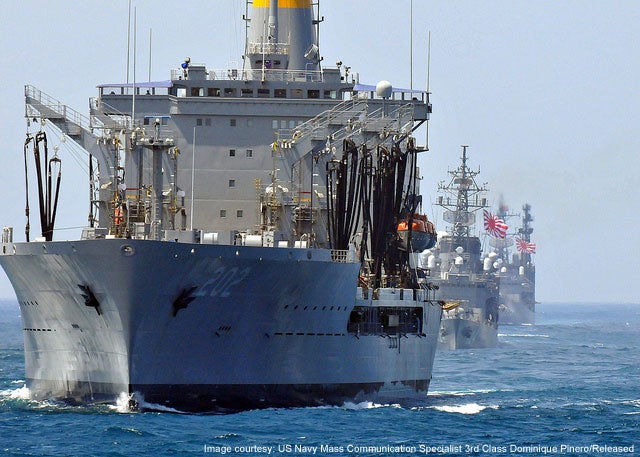
USNS Yukon (TAO 202) Henry J. Kaiser Class fleet replenishment oiler.
The US Navy’s RIMPAC fleet will be supported by five support or replenishment ships with one, the Henry J. Kaiser Class oiler USNS Henry J. Kaiser chosen to support the Great Green Fleet and its biofuel demands. The second Henry J. Kaiser Class oiler, the USNS Yukon, will participate despite colliding with USS Essex in May 2012.
The Safeguard Class salvage ship USNS Salvor, the Lewis and Clark Class dry cargo ship USNS Matthew Perry and the Legend Class national security cutter USCGC Bertholf make up the rest of the US Navy’s support and replenishment ships.
- USCGC Bertholf (WMSL 750) – Legend Class cutter
- USNS Yukon (TAO 202) – Henry J. Kaiser Class oiler
- USNS Henry J. Kaiser (TAO 187) – Henry J. Kaiser Class oiler
- USNS Matthew Perry (T-AKE 9) – Lewis & Clark Class cargo ship
- USNS Salvor (T-ARS 52) – Safeguard Class salvage ship
Related content
RIMPAC 2012: the aircraft and helicopters
As nations around the Pacific Rim descend upon Hawaii for the start of the exercise, naval-technology.com, in partnership with airforce-technology.com, profile the naval aircraft and helicopters taking part in the exercise.
RIMPAC 2012: Great Green Fleet, communications and Yellow Sea security
More than 40 ships, six submarines and 200 aircraft are due to take part in the largest international maritime warfare exercise. As the world’s navies descend upon Hawaii for RIMPAC 2012, Liam Stoker analyses some key and emerging issues for this year’s exercise.




